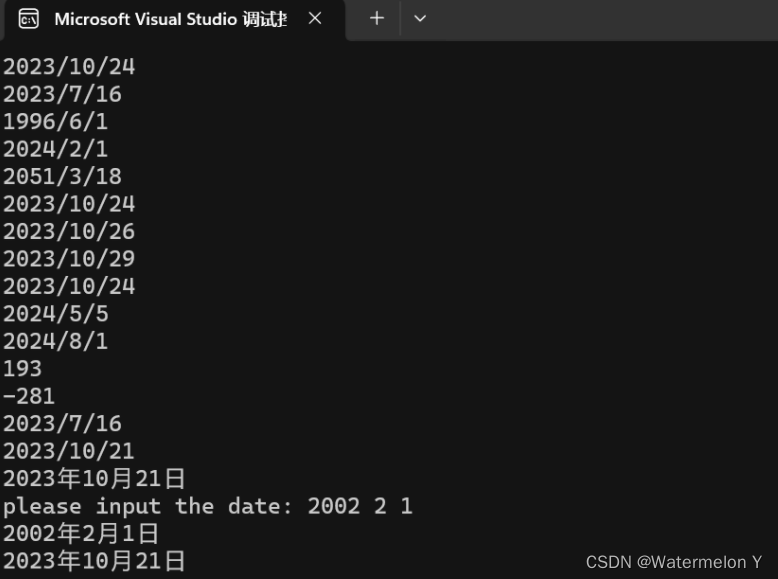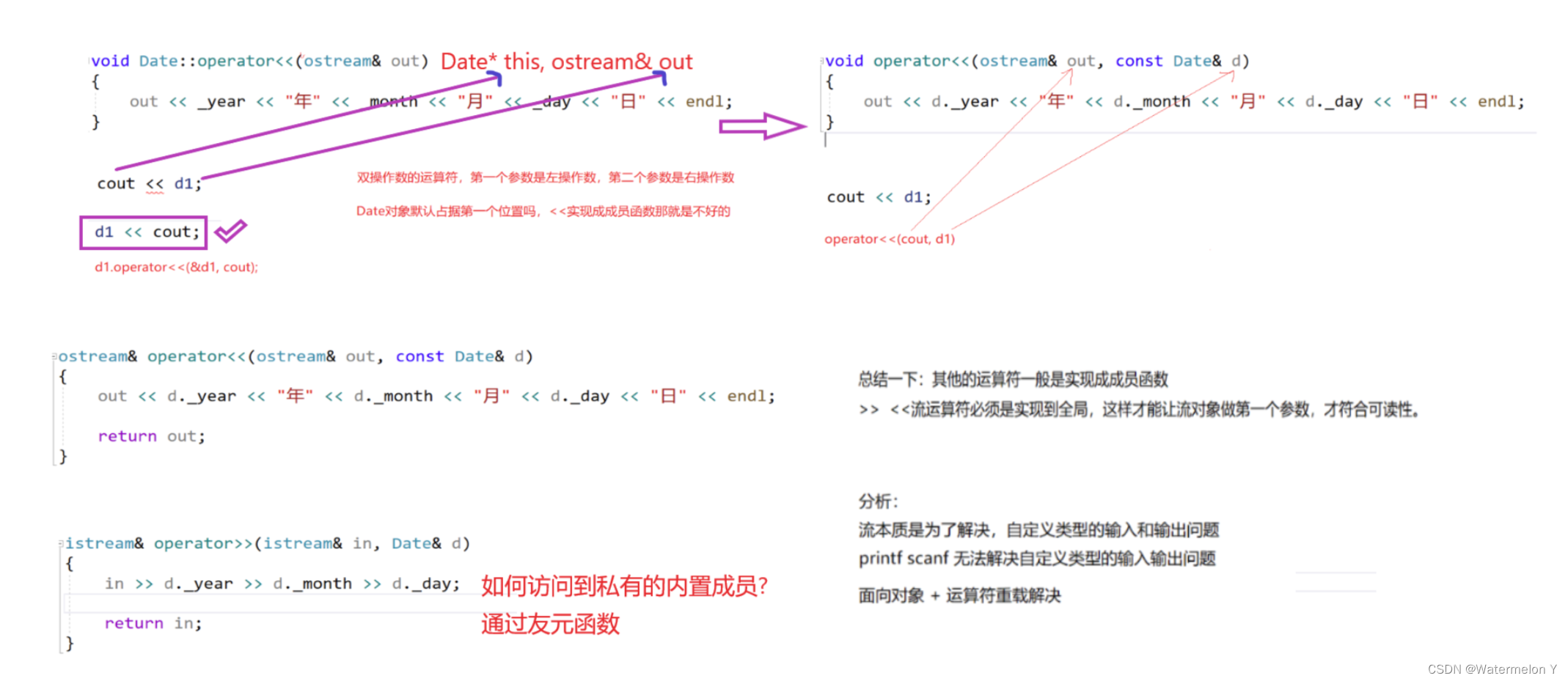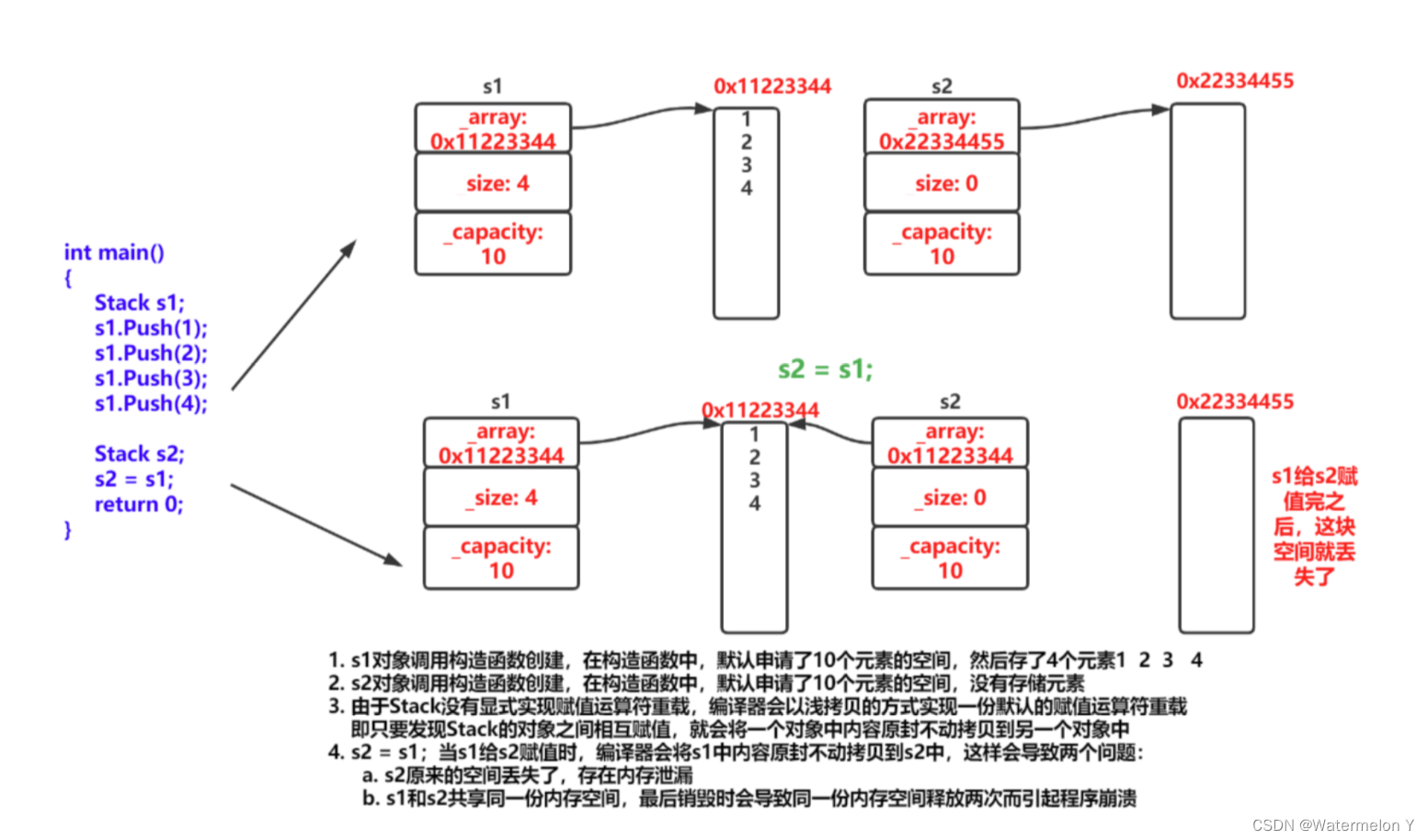目录
一 概念
C++为了增强代码的可读性引入了运算符重载,运算符重载是具有特殊函数名的函数,也具有其返回值类型,函数名字以及参数列表,其返回值类型与参数列表与普通的函数类似。
函数名字为:关键字operator后面接需要重载的运算符符号。
函数原型:返回值类型 operator操作符(参数列表)
注意:
不能通过连接其他符号来创建新的操作符:比如operator@
重载操作符必须有一个类类型参数
用于内置类型的运算符,其含义不能改变,例如:内置的整型 + ,不能改变其含义
作为类成员函数重载时,其形参看起来比操作数数目少1,因为成员函数的第一个参数为隐藏的this
总之如何去比较自定义类型, 并且要有可读性, 那就需要运算符重载
二 运算符重载的实现
// 全局的operator==
class Date
{
public:
Date(int year = 1900, int month = 1, int day = 1)
{
_year = year;
_month = month;
_day = day;
}
//private:
int _year;
int _month;
int _day;
};
// 这里会发现运算符重载成全局的就需要成员变量是公有的,那么问题来了,封装性如何保证?
// 这里其实可以用我们后面学习的友元解决,或者干脆重载成成员函数。
bool operator==(const Date& d1, const Date& d2)
{
return d1._year == d2._year//如果成员变量不是共有的那就访问不到了
&& d1._month == d2._month
&& d1._day == d2._day;
}
void Test1()
{
Date d1(2018, 9, 26);
Date d2(2018, 9, 27);
/*cout << operator>(d1, d2) << endl;
cout << operator==(d1, d2) << endl;*/
cout << (d1 == d2) << endl;
}
int main()
{
Test1();
return 0;
}
现在我们把==运算符重载到成员函数中
// 全局的operator==
class Date
{
public:
Date(int year = 1900, int month = 1, int day = 1)
{
_year = year;
_month = month;
_day = day;
}
bool operator==(const Date& dd2)
{
return _year == dd2._year
&& _month == dd2._month
&& _day == dd2._day;
}
private:
int _year;
int _month;
int _day;
};
void Test2()
{
Date d1(2018, 9, 26);
Date d2(2018, 9, 27);
/*cout << operator>(&d1, d2) << endl;
cout << operator==(&d1, d2) << endl;*/
cout << (d1 == d2) << endl;
}
int main()
{
Test2();
return 0;
}

总结:
运算符重载 函数重载 他们之间没有关联
运算符重载:自定义类型可以直接使用运算符
函数重载:可以允许参数不同的同名函数,
内置类型对象可以直接用各种运算符,内置类型都是简单类型
语言自己定义,编译直接转换成指令
自定义类型呢?不支持 所以运算符重载诞生
不能被重载的运算符只有5个, 点号.三目运算 ? : 作用域访问符::运算符sizeof 以及.*(*是可以重载的 只是点星是不能的)
三 关于时间的所有运算符重载
1 Date.h
#pragma once
#include<iostream>
#include<assert.h>
using namespace std;
class Date
{
public:
//全缺省参数只需要在声明中
Date(int year = 1, int month = 1, int day = 1);
void Print();
int GetMonthDay(int year, int month);
Date& operator=(const Date& d);
bool operator==(const Date& y);
bool operator!=(const Date& y);
bool operator>(const Date& y);
bool operator<(const Date& y);
bool operator>=(const Date& y);
bool operator<=(const Date& y);
int operator-(const Date& d);
Date& operator+=(int day);
Date operator+(int day);
Date& operator-=(int day);
Date operator-(int day);
Date& operator++();
Date operator++(int);
Date& operator--();
Date operator--(int);
//友元函数
friend ostream& operator<<(ostream& out, const Date& d);
friend istream& operator>>(istream& in, Date& d);
private:
int _year;
int _month;
int _day;
};
ostream& operator<<(ostream& out, const Date& d);
istream& operator>>(istream& in, Date& d);
2 Date.cpp
#define _CRT_SECURE_NO_WARNINGS 1
#include"Date.h"
int Date:: GetMonthDay(int year, int month)
{
int days[13] = { 0, 31, 28, 31, 30, 31, 30, 31, 31, 30, 31, 30, 31 };
int day = days[month];
if (month == 2 && (year % 4 == 0 && year % 100 != 0) && (year % 100 == 0))
{
day += 1;
}
return day;
}
//构造函数
Date:: Date(int year, int month, int day)
{
_year = year;
_month = month;
_day = day;
}
void Date::Print()
{
cout << _year << "/" << _month << "/" << _day << endl;
}
//赋值运算符
Date& Date::operator=(const Date& d)
{
if (*this != d)
{
_year = d._year;
_month = d._month;
_day = d._day;
}
return *this;
}
//赋值运算符如果不显式实现,编译器会生成一个默认的。此时用户再在类外自己实现一个全局的赋值运算符重载,
//就和编译器在类中生成的默认赋值运算符重载冲突了,故赋值运算符重载只能是类的成员函数
bool Date::operator==(const Date& d)
{
return (_day == d._day && _month == d._month && _year == d._year);
}
bool Date::operator!=(const Date& d)
{
return !(*this == d);
}
bool Date::operator>(const Date& d)
{
if (_year > d._year)
{
return true;
}
else if (_year == d._year && _month > d._month)
{
return true;
}
else if (_year == d._year && _month == d._month && _day > d._day)
{
return true;
}
else
{
return false;
}
}
bool Date:: operator>=(const Date& d)
{
return (*this == d) || (*this > d);
}
bool Date::operator<(const Date& d)
{
return !(*this >= d);
}
bool Date:: operator<=(const Date& d)
{
return !(*this > d);
}
//在类里面是不用区分函数顺序的
Date& Date::operator+=(int day)
{
if (day < 0)
{
return *this -= (-day);
}
_day = _day + day;
while (_day > GetMonthDay(_year, _month))
{
_day -= GetMonthDay(_year, _month);
++_month;
if (_month == 13)
{
++_year;
_month = 1;
}
}
return *this;
}
Date Date:: operator+(int day)
{
Date tmp(*this);
tmp += day;
return tmp;
}
Date& Date:: operator-=(int day)
{
if (day < 0)
{
*this += (-day);
}
_day -= day;
while (_day < 0)
{
--_month;
if (_month == 0)
{
--_year;
_month = 12;
}
_day += GetMonthDay(_year, _month);
}
return *this;
}
Date Date:: operator-(int day)
{
Date tmp(*this);
tmp -= day;
return tmp;
}
//++d1
Date& Date::operator++()
{
*this += 1;
return *this;
}
//d1++
Date Date::operator++(int)
{
Date tmp(*this);
*this += 1;
return tmp;
}
//--d1
Date& Date::operator--()
{
*this -= 1;
return *this;
}
//d1--
Date Date::operator--(int)
{
Date tmp(*this);
*this -= 1;
return tmp;
}
//d1 -100
int Date::operator-(const Date& d)
{
//假设左大右小
int flag = 1;
Date max = *this;
Date min = d;
if (*this < d)
{
flag = -1;
min = *this;
max = d;
}
int n = 0;
while (min != max)
{
min++;
n++;
}
return n * flag;
}
ostream& operator<<(ostream& out, const Date& d)
{
out << d._year << "年" << d._month << "月" << d._day << "日" << endl;
return out;
}
istream& operator>>(istream& in, Date& d)
{
in >> d._year >> d._month >> d._day;
return in;
}
3 Test.cpp
#define _CRT_SECURE_NO_WARNINGS 1
#include "Date.h"
void TestDate1()
{
Date d1(2023, 10, 24);
d1.Print();
Date ret1 = d1 - 100;
ret1.Print();
Date ret2 = d1 - 10000;
ret2.Print();
Date ret3 = d1 + 100;
ret3.Print();
Date ret4 = d1 + 10000;
ret4.Print();
}
void TestDate2()
{
Date d1(2023, 10, 24);
d1.Print();
// 语法设计,无法逻辑闭环,那么这时就只能特殊处理
// 特殊处理
++d1;
d1.operator++();
d1.Print();
d1++;
d1.operator++(10);
d1.operator++(1);
d1.Print();
}
void TestDate3()
{
Date d1(2023, 10, 24);
d1.Print();
Date d2(2024, 5, 5);
d2.Print();
Date d3(2024, 8, 1);
d3.Print();
cout << d2 - d1 << endl;
cout << d1 - d3 << endl;
}
void TestDate4()
{
Date d1(2023, 10, 24);
d1 += -100;
d1.Print();
}
void Test5()
{
Date d1(2023, 10, 21);
Date d2(2023, 12, 31);
d1.Print();
cout << d1;
cin >> d2;
cout << d2 << d1 << endl;
}
int main()
{
TestDate1();
TestDate2();
TestDate3();
TestDate4();
Test5();
return 0;
}

解释一下<< >>运算符重载

对友元函数不太了解的 可以【C++】类和对象(7)--友元, static成员-CSDN博客
四 默认赋值运算符
用户没有显式实现时,编译器会生成一个默认赋值运算符重载,以值的方式逐字节拷贝。注 意:内置类型成员变量是直接赋值的,而自定义类型成员变量需要调用对应类的赋值运算符 重载完成赋值。
Date MyStack这些就不用自己构造赋值运算符重载, 但是栈这些就必须要自己构造, 因为涉及到了资源的拷贝
注意:如果类中未涉及到资源管理,赋值运算符是否实现都可以;一旦涉及到资源管理则必 须要实现。
// 这里会发现下面的程序会崩溃 这里就需要我们以后讲的深拷贝去解决。
typedef int DataType;
class Stack
{
public:
Stack(size_t capacity = 10)
{
_array = (DataType*)malloc(capacity * sizeof(DataType));
if (nullptr == _array)
{
perror("malloc申请空间失败");
return;
}
_size = 0;
_capacity = capacity;
}
void Push(const DataType& data)
{
// CheckCapacity();
_array[_size] = data;
_size++;
}
~Stack()
{
if (_array)
{
free(_array);
_array = nullptr;
_capacity = 0;
_size = 0;
}
}
private:
DataType* _array;
size_t _size;
size_t _capacity;
};
int main()
{
Stack s1;
s1.Push(1);
s1.Push(2);
s1.Push(3);
s1.Push(4);
Stack s2;
s2 = s1;
return 0;
}
改正如下
typedef int DataType;
class Stack
{
public:
Stack(size_t capacity = 10)
{
_array = (DataType*)malloc(capacity * sizeof(DataType));
if (nullptr == _array)
{
perror("malloc申请空间失败");
return;
}
_size = 0;
_capacity = capacity;
}
void Push(const DataType& data)
{
// CheckCapacity();
_array[_size] = data;
_size++;
}
void Pop()
{
_size--;
}
DataType Top()
{
return _array[_size - 1];
}
bool Empty()
{
return _size == 0;
}
Stack& operator=(Stack& st)
{
_array = (int*)malloc(sizeof(int) * st._capacity);
if (_array == nullptr)
{
perror("malloc fail");
exit(-1);
}
memcpy(_array, st._array, sizeof(int) * st._size);
_size = st._size;
_capacity = st._capacity;
}
~Stack()
{
if (_array)
{
free(_array);
_array = nullptr;
_capacity = 0;
_size = 0;
}
}
private:
DataType* _array;
size_t _size;
size_t _capacity;
};
int main()
{
Stack s1;
s1.Push(1);
s1.Push(2);
s1.Push(3);
s1.Push(4);
while (!s1.Empty())
{
printf("%d ", s1.Top());
s1.Pop();
}
printf("\n");
Stack s2;
s2 = s1;
s2.Push(5);
s2.Push(6);
s2.Push(7);
s2.Push(8);
while (!s2.Empty())
{
printf("%d ", s2.Top());
s2.Pop();
}
return 0;
}

讲一下为什么

五 const取地址操作符重载
这两个默认成员函数一般不用重新定义 ,编译器默认会生成。
Date* operator&() //返回类型为 Date*
{
cout << "Date* operator&()" << endl;
return this;
}
const Date* operator&()const//返回类型为 const Date*
{
cout << "const Date* operator&()const" << endl;
return this;
}
当然不是const的地址也可以调用const类型, 只不过两个都存在的时候, 会优先调用最匹配的一个
这两个运算符一般不需要重载,使用编译器生成的默认取地址的重载即可,只有特殊情况,才需 要重载,比如想让别人获取到指定的内容!
本节感觉理解起来还是比较抽象, 有时候记住咋用就行了, 祖师爷就是这样规定的, 但是底层的东西我们还是得好好琢磨一下.对于类和对象基础要求挺高. 大家可以看看我之前的博客.
继续加油!





















 1698
1698











 被折叠的 条评论
为什么被折叠?
被折叠的 条评论
为什么被折叠?








